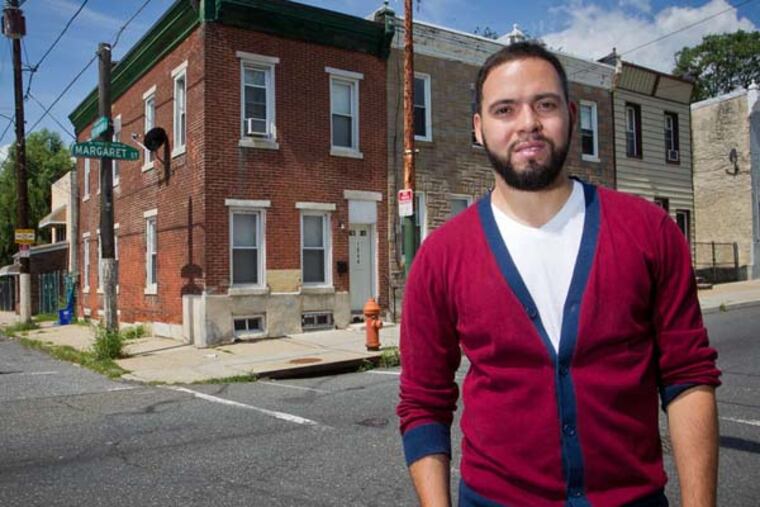Buying real estate at auction can be tricky, but profitable
Want to retire as a real estate mogul? You might start at Philadelphia's sheriff sales, where you can buy discounted properties at auction. Don't bring cash, and watch out for the real estate developers who try to intimidate the competition.

Want to retire as a real estate mogul?
You might start at Philadelphia's sheriff sales, where you can buy discounted properties at auction. Don't bring cash, and watch out for the real estate developers who try to intimidate the competition.
In an effort to clean up a Wild West atmosphere at the sales, Sheriff Jewell Williams has built an online property database of parcels coming to auction and installed a strong police presence the day of bidding.
At a recent auction, Williams and his deputies monitored the goings-on in the large conference room at 3801 Market St., where most auctions take place, and he directed departmental police officers to patrol among bidders.
With crowds of people shouting out bids, competition was fierce. Retirees, real estate lawyers, developers, contractors, sometimes even entire families rubbed shoulders looking for deals. Prices ranged from a few thousand to hundreds of thousands of dollars.
Why the police presence?
"Sometimes, there are rival groups that try to intimidate each other out of buying a property one of them really wants," Williams says. "We need to make sure that doesn't happen and people feel safe."
The Sheriff's Department also offers escorts to the parking lot if a buyer feels threatened. To cut down on the potential for illicit money changing hands, cash is no longer accepted at the sales.
To view the database, go to www.officeofphiladelphiasheriff.com, click on the tab for "Real Estate" and look for "Sheriff's Sale Properties." Or you can visit the sheriff's offices in the Land Title Building (100 S. Broad St.) during business hours to view the list.
Caveat emptor: About a third of those properties don't come up for bid the first time because lawyers and delinquent owners file last-minute paperwork for a stay.
Also, you can't touch the merchandise ahead of time. Potential bidders can visit an address, but can't enter the building.
Years ago, buying through sheriff's sale was a tediously slow process. "It could take six months for a buyer to get a deed to their property. Today, deeds are generally available about four to six weeks after settlement," Williams says.
Aim to set up ownership through a limited liability company, says accountant David L. Zalles of Blue Bell.
And don't use your IRA or other retirement account to buy a property, he advises. Otherwise, you may end up paying a big tax bill if you have to sell it.
In addition, he says, examine the tax implications of any real estate sale. If you hold a property for at least two years, you generally pay a lower capital-gains tax rate, rather than the higher ordinary income rate on profits. "There are ups and downs in the real estate market, and the older you are, the less time you have to recover financially."
Zalles had one client in real estate who moved into the properties she bought and established residency.
"The properties became her personal residence. There's a $250,000-per-person exclusion on profits and $500,000 per couple. She would buy a $750,000 property and fix it up and sell it for $1 million and keep the profits tax free."
Some families have made successful businesses out of sheriff's sale auctions. Carlos and Juan Sosa, a father-son real estate team, have bid and won several properties in North Philadelphia.
"My father has been a property investor most of his life," Juan Sosa says.
Carlos Sosa, 48, doesn't speak English as well as his son, so they work as a team.
It's a business from which "my dad can retire someday, and I'm learning," Juan Sosa adds.
Carlos Sosa "saw a sign on a house, it was up for auction. We noticed a lot of people were buying properties for less than $10,000. They need work, of course, but they turn out to be good buys," Juan Sosa says.
There can be drawbacks, too.
"There's a lot of people who bid on the wrong type of property - and you don't get your deposit back," he says.
But for first-time or investor buyers, Sosa says, "Where else can you buy a house for $5,000?"
His advice to newbies: Stay away from sheriff's sales of homes that involve mortgages.
They "involve more homework. You have to like the house on the outside. And remember, you can't go inside," he says.
The best part of buying at auction is a clear title: "If the previous owner owed water or taxes, they clear everything. The title should be clear" once the sale is complete, Sosa says.
The elder Sosa bought his first property for less than $3,500, and subsequently purchased others, mostly less than $20,000. By renting his properties for an average $800 a month, minus $500 a year for insurance, "he can pay off the property in four to five years," his son says.
215-854-2808 @erinarvedlund